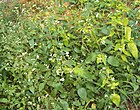Note: This is a project under development. The articles on this wiki are just being initiated and broadly incomplete. You can Help creating new pages.
Ageratum conyzoides - Vishamushti
Vishamushti is a coarse annual plant with an erect stem and a strong, unpleasant smell. It can grow up to about 1 metre tall. It is a common weed of the tropical zone. It is also sometimes grown as an ornamental plant and is commonly used as a traditional medicine.
Contents
- 1 Uses
- 2 Parts Used
- 3 Chemical Composition
- 4 Common names
- 5 Properties
- 6 Habit
- 7 Identification
- 8 List of Ayurvedic medicine in which the herb is used
- 9 Where to get the saplings
- 10 Mode of Propagation
- 11 How to plant/cultivate
- 12 Commonly seen growing in areas
- 13 Photo Gallery
- 14 References
- 15 External Links
Uses
Wound healing, Anorexia, Dyspepsia, Renal calculi, Hemorrhoids.[1]
Parts Used
Chemical Composition
The leaf is reported to contain stigmasterol (59.9%) and beta-sitosterol (26.7%) as major component of sterol faction. The dried flowering plant contains the pyrrolizidine alkaloids, lycopsamine and echinatine.[2]
Common names
| Language | Common name |
|---|---|
| Kannada | Helukasa, Naayi thulasi |
| Hindi | Bhakumbar, Visadodi |
| Malayalam | Kattappa, Muriyan |
| Tamil | Aappakkoti, Pumpillu |
| Telugu | Pokabanthi |
| Marathi | NA |
| Gujarathi | NA |
| Punjabi | NA |
| Kashmiri | NA |
| Sanskrit | Visamustih |
| English | Goat weed |
.[3]
Properties
Reference: Dravya - Substance, Rasa - Taste, Guna - Qualities, Veerya - Potency, Vipaka - Post-digesion effect, Karma - Pharmacological activity, Prabhava - Therepeutics.
Dravya
Rasa
Tikta (Bitter), Katu (Pungent)
Guna
Laghu (Light), Rooksha (Dry), Teekshna (Strong)
Veerya
Ushna (Hot)
Vipaka
Karma
Vata, Kapha
Prabhava
Habit
Identification
Leaf
| Kind | Shape | Feature |
|---|---|---|
| Simple | Opposite | 5-7 x 3-5 cm, ovate, apex acute, crenate, base rounded; petiole 1-3 cm long. |
Flower
| Type | Size | Color and composition | Stamen | More information |
|---|---|---|---|---|
| Bisexual | Terminal heads | White-blue | 5 | Heads white, to 7 mm across, in terminal corymbose panicle; bracts 1-3-seriate, 3-4 mm long, elliptic, toothed at apex, 3-ribbed. Flowers all similar, bisexual. Flowering: July - December |
Fruit
| Type | Size | Mass | Appearance | Seeds | More information |
|---|---|---|---|---|---|
| Achene | 2 mm long | Linear, 5-angled, hirsute along the angles; pappus 3-4 mm long, many, setaceous | Many | Fruiting: July - December |
Other features
List of Ayurvedic medicine in which the herb is used
Where to get the saplings
Mode of Propagation
How to plant/cultivate
Season to grow
Soil type
Propagation
Commonly seen growing in areas
Tropical area, Sub tropical area
Photo Gallery
References
External Links
- Ayurvedic Herbs known to be helpful to treat Wound healing
- Ayurvedic Herbs known to be helpful to treat Anorexia
- Ayurvedic Herbs known to be helpful to treat Dyspepsia
- Ayurvedic Herbs known to be helpful to treat Renal calculi
- Ayurvedic Herbs known to be helpful to treat Hemorrhoids
- Herbs with Whole plant used in medicine
- Herbs with common name in Kannada
- Herbs with common name in Hindi
- Herbs with common name in Malayalam
- Herbs with common name in Tamil
- Herbs with common name in Telugu
- Herbs with common name in Sanskrit
- Herbs with common name in English
- Habit - Herb
- Index of Plants which can be propagated by Seeds
- Index of Plants which can be propagated by Cuttings
- Herbs that are commonly seen in the region of Tropical area
- Herbs that are commonly seen in the region of Sub tropical area
- Herbs
- Asteraceae
- Ayurvedic herbs that don't have seed photos




